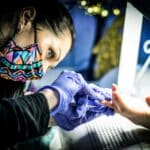By: Overnight Publicity
Bullying remains a pervasive issue in our schools and communities, even in today’s digital world. Despite numerous anti-bullying campaigns, harmful behavior continues to thrive where intolerance and indifference exist. However, there’s hope in the form of empathy and compassion. By integrating these values into our daily interactions, we can address the root causes of bullying.
Allicia Flemons, a dedicated school psychologist and advocate against bullying, supports programs that promote social-emotional learning and foster strong bonds between students. She believes that understanding and kindness are essential life skills, not just supplementary lessons. Through her innovative approaches in classrooms and communities, Allicia demonstrates how empathy and compassion can transform school culture.
Creating inclusive classroom activities that celebrate diversity is crucial to fostering empathy. When students learn about different cultures, traditions, and perspectives, they broaden their views and break down stereotypes. These activities provide students with opportunities to share their stories, creating a sense of belonging and mutual respect among peers.
Open communication is equally important. Safe spaces where students can express themselves without fear of judgment or retaliation are vital. These environments encourage honest conversations about personal experiences with bullying or discrimination, leading to healing and understanding.
Allicia’s initiatives extend beyond traditional classroom settings, involving parents, caregivers, and community members in building a unified front against bullying. Workshops focusing on empathetic communication teach adults how to model compassionate behavior in every interaction.
One of Allicia’s notable projects paired students from different backgrounds to work together on tasks over several weeks. The goal was simple yet profound: to highlight commonalities rather than differences. This project led to unexpected friendships across cultural divides, demonstrating the power of empathy to bridge gaps.
This approach aligns with research suggesting that when people see themselves in others’ stories, prejudice decreases and empathy grows. Allicia aims to amplify this shared human experience through her work.
The success stories from these initiatives speak volumes about their impact. Students who once felt marginalized now feel seen and valued. Instances of bullying have significantly decreased as a culture of kindness takes root.
By prioritizing empathy and compassion in our interactions, we do more than just address bullying—we lay the foundation for a future marked by inclusion, understanding, and kindness. Together, we can create a world where everyone can thrive.
Ending bullying is a complex task that requires unwavering dedication to creating environments where every student feels safe, respected, and understood, regardless of their background or beliefs. Through continuous education about the importance of empathy and practical steps to embody this value, we move closer to eradicating bullying.
Allicia’s passion for this cause stems from her own painful experiences with bullying and rumors. In high school and college, she faced false rumors and public shaming that followed her throughout her life, causing continued distress and harassment. As someone with autism, Allicia found it particularly challenging to navigate these social situations, often struggling with anxiety and communication difficulties. Despite these obstacles, she refused to let the actions of others define her. Instead, she leaned on her faith and determination, using her experiences as fuel to help others and fulfill her purpose of creating safer, more empathetic environments for all students.
Allicia Flemons’ story is more than just a fight against bullying; it’s a call for all of us to reflect on our actions and inactions regarding promoting understanding over division. It reminds us that each act of kindness significantly contributes to building a world free from harassment—a world where everyone can thrive without fear.
However, creating this transformation requires more than isolated programs—it demands ongoing commitment from everyone in the education system. As Allicia often highlights in her speeches, empathy isn’t just learned; it’s lived.
As we move forward together with determination to create communities grounded in empathy and compassion, let us remember the transformative power of open hearts willing to fully understand another’s struggles.
For more about Allicia Flemons’ advocacy or to seek guidance on dealing with similar issues, you can visit her interview on Concho Valley News. This platform is dedicated to sharing stories that inspire change and offer support to those in need.
Published by: Martin De Juan









